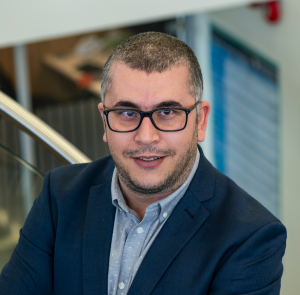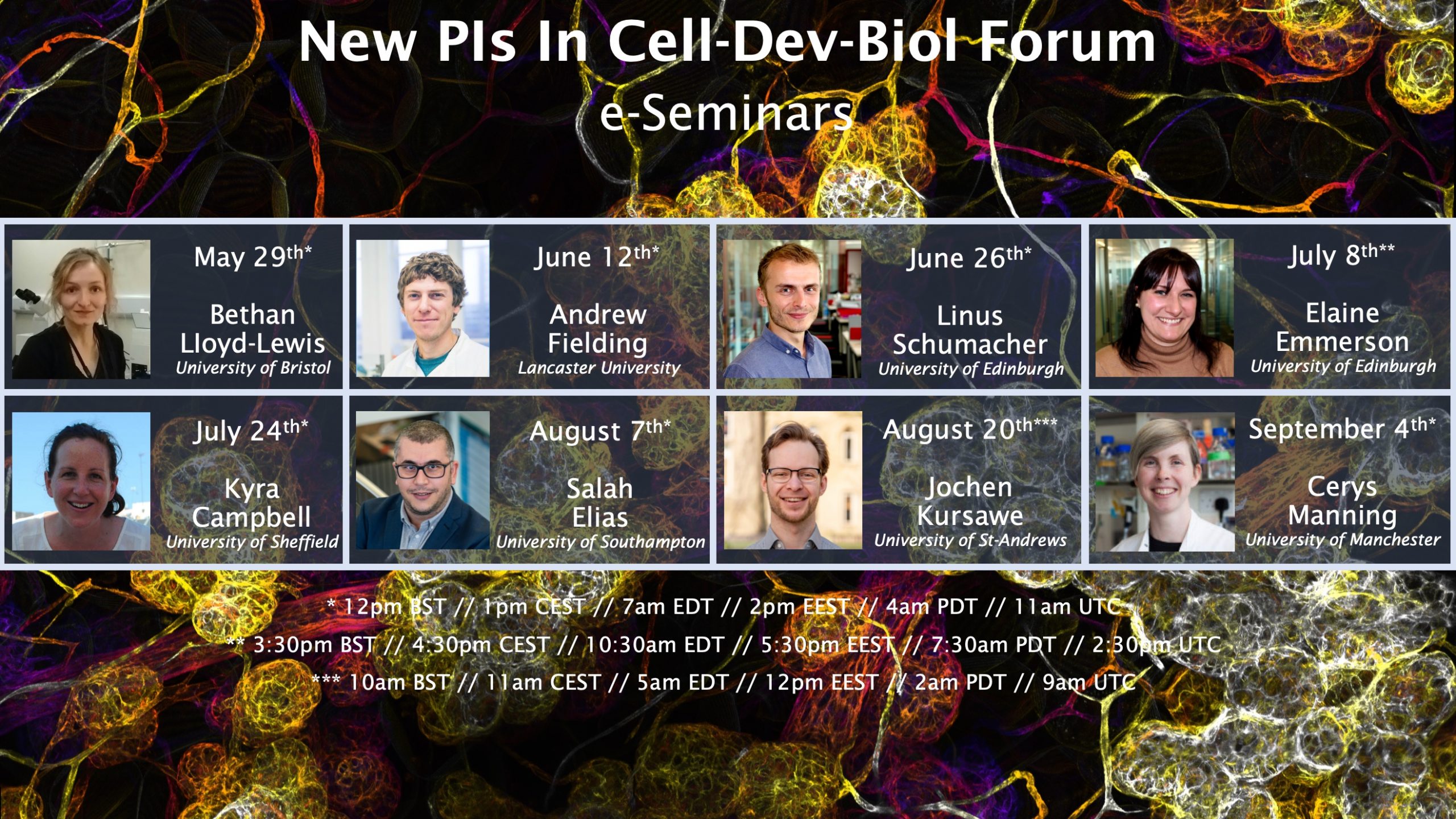Salah Elias introduces a new virtual forum for early PIs in cell and developmental biology
Posted by the Node Interviews, on 29 June 2020
Of the many virtual seminar series that have sprung up in response to the COVID-19 pandemic, one in particular caught our eye – the New PIs in Cell and Developmental Biology Forum (you can follow updates and find information by following #NewPICellDev on Twitter). To find out more about the series we met Salah Elias, new PI at the University of Southampton and organiser of the forum (you can read Salah’s bio at the end of the interview).
How did you come to run your own lab and what are your main research questions?
My move to the University of Southampton in 2017 and appointment to a  lectureship enabled me to start my own independent laboratory building on my postdoctoral research. This has involved bringing together expertise from cell biology, physics and mathematics to investigate new microtubule- and actin-mediated mechanisms of oriented cell divisions (OCDs) in the normal mammary epithelium, and determine how this influences stem cell fate and dynamics during development and homeostasis. OCDs represent an essential mechanism during development that ensure proper epithelial integrity and differentiation in several epithelial systems. Yet their functional requirement for mammary epithelial biology remains subject to deliberation. This is a fundamental and important question for my lab, particularly in the mammary gland where tissue turnover is very high. Moreover, given increasing evidence linking dysregulation is OCDs to breast cancer, my lab aims to understand how imbalance in OCDs can lead to the abnormal cell fate and behaviour that contributes to the initiating events of malignant transformation. Our multidisciplinary approach has allowed us to develop a set of cutting-edge tools and novel ideas that open up new research directions and help us establish our own niche.
lectureship enabled me to start my own independent laboratory building on my postdoctoral research. This has involved bringing together expertise from cell biology, physics and mathematics to investigate new microtubule- and actin-mediated mechanisms of oriented cell divisions (OCDs) in the normal mammary epithelium, and determine how this influences stem cell fate and dynamics during development and homeostasis. OCDs represent an essential mechanism during development that ensure proper epithelial integrity and differentiation in several epithelial systems. Yet their functional requirement for mammary epithelial biology remains subject to deliberation. This is a fundamental and important question for my lab, particularly in the mammary gland where tissue turnover is very high. Moreover, given increasing evidence linking dysregulation is OCDs to breast cancer, my lab aims to understand how imbalance in OCDs can lead to the abnormal cell fate and behaviour that contributes to the initiating events of malignant transformation. Our multidisciplinary approach has allowed us to develop a set of cutting-edge tools and novel ideas that open up new research directions and help us establish our own niche.
How has your research been affected by the lock down?
The COVID-19 pandemic has caused unprecedented disruptions within the entire research community. It has also exacerbated existing inequalities, with new PIs representing one of the most affected groups. As a new PI, closing my lab, which I have managed to get up and running after a challenging and time-consuming process, was heart-breaking. After I joined the University of Southampton, I have been able to secure major grants, hire talented PhD students and postdocs and develop excellent collaborations. We have started to work on our ideas and get exciting findings, which we were looking forward to sharing this year at conferences. The pandemic reminded me how vulnerable and precarious my position as a new PI was. In few days we have had to cull several experimental mouse cohorts which we have been preparing several months in advance and thrown away many long-term in vivo imaging experiments which have taken months to prepare. We stopped all our research within a week. Suddenly, I also found myself with childcare responsibilities, which I couldn’t share with my wife who is a key NHS worker. This has considerably disrupted my productivity and challenged my ability to run my lab. All this would delay time to publish my lab first independent publications, putting at risk the competitiveness and sustainability of my research program.
How did the idea for a young PI forum in cell and developmental biology come up?
One of the immediate consequences of the lockdown was the cancellation of conferences. For my lab, this has taken away many opportunities to showcase and discuss our research. We know how conferences are important particularly for new PIs, by offering excellent networking and career development opportunities. They are also the place where we can make the scientific community aware of our accomplishments and thereby build a reputation that is important for our careers. For me, working from home has also been very isolating and challenging mentally. Many peers around the world have shared their frustrations and struggles through social-media platforms such as Twitter. It was great to see many established PIs relaying actively those concerns and urging the scientific community to protect new PIs during and after the pandemic. However, I thought that new PIs, as a community, could be proactive and help each other. This is how the idea for the New PIs in Cell-Dev-Biol Forum emerged. The forum would include e-seminars, but I also wanted it a platform that maintains connections and fosters peer support. I discussed the idea with Dr. Bethan LIoyd-Lewis, new PI at the University of Bristol, which she endorsed immediately. Then, everything went fast, the first colleagues we have contacted responded positively, and within a week we had our e-seminars with a fantastic fist line-up of speakers. We advertised on Twitter, it was really heartening to see how positively the scientific community has responded and helped us promote the forum. The e-seminars have started already with success.
How does the forum work?
The primary goal of the forum is to be a platform for peer support and collaboration, supported by an e-seminar series where talks are organized every two weeks. Our top priority, particularly during the lockdown, is to offer opportunities for new PIs to give and host talks. Speakers will be encouraged to present unpublished results to promote discussions and collaborations. We advertise through Twitter, where we post a link for each talk. We have also created a Slack (@NewPI_CellDev), which allows us to maintain connections, support each other and exchange ideas about the future of the forum. I am pleased to see how everyone is taking ownership of the forum, which I believe is the best way to maximize contributions and achieve our goals together.
If people are interested in giving a talk, what do they have to do?
Three weeks after its creation, 30 new PIs from 20 UK and European research institutions have joined the forum already. We have a full program of talks until May 2021. Everyone who joins the forum is invited to give and host a talk. As I mentioned above, priority will be given to preliminary results, so colleagues who have just opened their labs are also welcome to share their research, particularly if they are seeking help for their grant applications. Advertising the forum and talks on Twitter allows us to reach the wider scientific community. Generally, when we receive expression of interests from colleagues, we ask them to send us their contact details through direct messaging or e-mail, so we can add them to our mailing list and send them an official invite. Our members are doing a fantastic job in promoting the forum within their own networks and institutions. However, we are also aware that not all our colleagues have a Twitter account. We hope that societies such as the Company of Biologists will help us to be more visible to increase our membership.
Do you expect to keep the forum going when the lockdown ends, whenever that may be?
Our first successes reinforce our ambition to create an international forum for new cell and developmental biologists, which lasts beyond the lockdown. We are aware that the consequences of the COVID-19 pandemic will affect our research and careers for the next few years at least. The forum will offer opportunities for peer support, networking and collaboration, andl represent a powerful mechanism fostering long-term equal partnership with mutual benefits. The forum will also be rewarding on a personal level, and I am looking forward for some really great friendships.
Do you think COVID-19 will change the way scientists share their work with each other?
Unquestionably, the COVID-19 pandemic has brought new opportunities for science communication. It is amazing to witness how proactive and altruist the scientific community is, by turning big conferences virtual, and creating a variety of webinars and e-tutorials and open resources, in such a very short time. We have learned effective ways to make conferences more accessible and more ecologically friendly, while minimizing the costs. I am proud that our forum is taking part of this revolution in science communication. As a community, we need to continue in this vein to bring open science a step closer to reality.
Biography
Salah Elias studied cell biology and Physiology at Rouen University, France. He then did a PhD in neuroscience at INSERM U982, France, where he investigated the mechanisms of secretory vesicles biogenesis and trafficking in neuroendocrine cells, under the co-supervision of Prof Maite Montero-Hadjadje and Prof Youssef Anouar. During his first postdoctoral work in the lab of Dr. Sandrine Humbert at the Curie Institute, France, he showed that huntingtin and kinesin-1 regulate spindle orientation and apical polarity in mammary epithelial cells during development and homeostasis. He then moved to Prof Elizabeth Robertson lab at the Sir William Dunn School of Pathology, University of Oxford, where he identified a new subset of mammary stem cells, expressing Blimp1, that drive gland morphogenesis and homeostasis. In 2017, Salah was appointed Lecturer at the University of Southampton. His lab aims to understand the mechanisms of oriented cell division (OCD) in the normal mammary epithelium to discover cell division defects that are unique to breast cancer cells. Salah is the recipient of an MRC New Investigator Research Grant and Wellcome Trust Seed Award in Science.
Contact details:
School of Biological Sciences, University of Southampton, Highfield Campus, Southampton SO17 1BJ, United Kingdom
e-mail: s.k.elias@soton.ac.uk
Twitter: @theeliaslab



 (6 votes)
(6 votes)